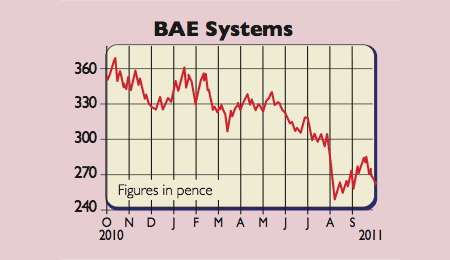
BAE Systems (LSE: BA), rated a BUY by Espírito Santo
The bright sparks at BAE have just invented a state-of-the-art system called Adaptiv that makes a 60 ton tank appear to vanish. Using onboard cameras to record nearby surroundings, they project these images onto panels on the outside of the vehicle. The result is that almost any tank can be camouflaged at the touch of a button and shielded from enemy infrared.
This is clever stuff, but it’s only a small part of the story. BAE has a whole host of other clever inventions on the go. For instance, it is a leading provider of internet security – covering everything from computer networks and airports to the supply of water, electricity and pharmaceuticals. Last November it was appointed by the FBI to work on an eight-year, $30bn deal to overhaul its antiquated IT platforms.
On the down side, government defence budgets are under pressure and BAE had to lay off 3,000 people (about 8% of its British workforce) last week, largely as a result of procurement deferrals for the Eurofighter Typhoon combat jet.
But BAE’s traditional kit still remains in demand. For example, the company’s products have been extensively deployed during the Arab Spring. In Libya, Tornado and Typhoon jets flown by the RAF were used to protect civilians against the Gaddafi regime. Meanwhile, in March the Saudi Arabian National Guard sent a fleet of BAE’s armoured vehicles into Bahrain to help suppress the embryonic pro-democracy movement.
The group is also busy building the Astute nuclear-powered submarines to replace Britain’s ageing Trafalgar fleet, and is a prime contractor on the forthcoming F-35 Joint Strike Fighter. The latter is the biggest weapons order in history, with the Pentagon expected to spend more than $300bn buying and servicing over 3,000 stealth planes. BAE supplies key components, including the tails, wing tips, fuel system, fuselage and life-support equipment.
Outside of the Nato countries, business is pretty buoyant. Britain has signed a bilateral agreement with Brazil that paves the way for BAE to assist its domestic armed forces. India – hemmed in by powerful China on the one side and belligerent Pakistan on the other – is also a booming market. South Korea, the Middle East and Australia are also all attractive markets.
So despite the City’s fretting about order cancellations, the world’s second-largest defence organisation was still able to hike its interim dividend by 7%. For the full year the City is forecasting turnover and underlying earnings per share (EPS) of £20.4bn and 39.3p respectively. That puts the shares on a price/earnings (p/e) ratio of 6.6, with a juicy 6.7% yield (twice covered).
I value the stock on a nine-times earnings before interest, tax, and amortisation multiple. After adjusting for the £3.2bn pension deficit, £1.1bn in net debt and another £1bn in possible retirement liabilities, that delivers a fair value of 360p a share.
Granted, there are a few clouds on the horizon. Dealing with politicians brings its usual headaches, and there are concerns over the impact of troop withdrawals and foreign-exchange issues.
Nonetheless, as illustrated by the conflict in Libya, defence spending will remain a necessity for governments. BAE also sports a gigantic £36.9bn backlog, providing good earnings visibility as well as boasting a research vault brimming with cutting-edge technology.
Espírito Santo has a 425p price target.
Rating: BUY at 258p
Disclosure: Paul Hill owns shares in BAE Systems.